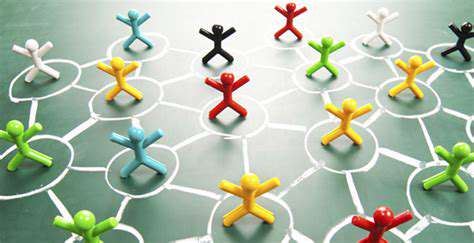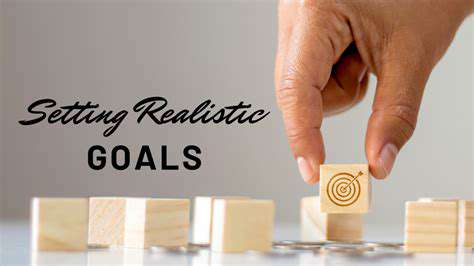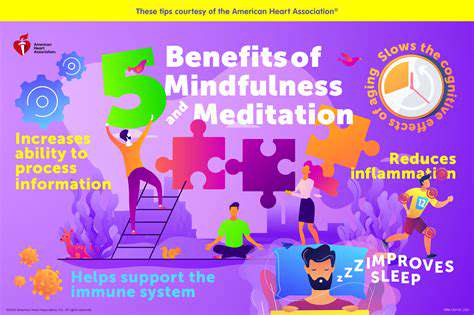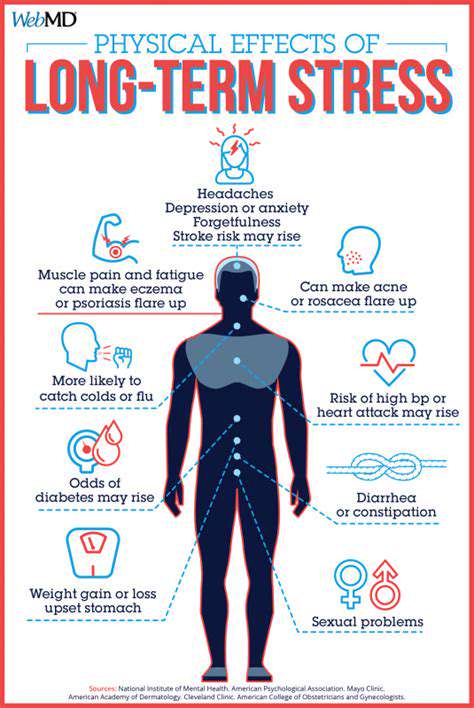Effective Strategies for Building Emotional Resilience in Daily Life
Fostering a Positive Mindset
Understanding the Power of Positivity
Positivity is a powerful tool that can shape our perceptions and reactions to the world around us. It allows us to view challenges as opportunities rather than obstacles, fostering an environment where growth can occur.
A positive mindset helps us to manage stress more effectively, as it enables us to approach problems with a solution-focused attitude. This shift in perspective not only enhances our emotional wellbeing but also contributes to better physical health.
Research has shown that individuals with a positive outlook tend to have stronger immune systems and lower rates of chronic diseases. Engaging in positive thinking can activate the body's relaxation response, reducing the levels of cortisol and adrenaline associated with stress.
Moreover, cultivating positivity can lead to improved relationships, as positive individuals often create a supportive atmosphere that encourages open communication and collaboration.
Ultimately, understanding the power of positivity is the first step toward fostering resilience. By consciously choosing to focus on the positive aspects of life, we pave the way for greater emotional stability and happiness.
Practicing Gratitude Daily
Incorporating gratitude into your daily routine can significantly enhance emotional resilience. Acknowledging and appreciating the good in our lives helps to shift focus away from negative thoughts, creating a more balanced perspective.
Starting a gratitude journal is an effective way to practice this. Each day, take a few moments to write down three things you are thankful for. This simple act can foster a sense of contentment and encourage a positive mental state.
Additionally, expressing gratitude doesn't have to be confined to oneself. Sharing feelings of thankfulness with friends, family, or colleagues can strengthen social bonds and create a supportive network that further enhances resilience.
Research has shown that regular gratitude practice can lead to increased happiness, lower levels of depression, and greater overall life satisfaction. By focusing on what we have rather than what we lack, we cultivate a mindset that appreciates abundance in our lives.
In conclusion, daily gratitude practice not only uplifts our spirits but also fortifies our emotional resilience, equipping us to navigate life's challenges with strength and grace.
Building Strong Social Connections
Social connections play a vital role in emotional resilience. Having a support system in place can provide comfort during difficult times, making it easier to cope with stressors and adversity.
To foster strong relationships, it's essential to invest time and energy into building social networks. This can involve reaching out to friends and family, joining community groups, or participating in activities that align with your interests.
Quality is just as important as quantity when it comes to friendships. Developing deep, meaningful connections with a few individuals can provide a sense of security and support, fostering a feeling of belonging.
Furthermore, being there for others can create a cycle of mutual support. When we offer help, we strengthen our ties and create an environment where we can lean on each other during tough times.
Ultimately, building strong social connections not only enhances our emotional resilience but also enriches our lives, allowing us to share experiences, joy, and even challenges together.
Embracing Mindfulness and Self-Compassion
Mindfulness involves being present in the moment, which can lead to a greater understanding of our thoughts and emotions. Practicing mindfulness can help break the cycle of negative thinking and promote emotional resilience.
Incorporating mindfulness techniques, such as meditation or deep breathing exercises, into daily life encourages a state of awareness and acceptance. This practice allows us to recognize our feelings without judgment, creating space for understanding and self-compassion.
Self-compassion is equally important; it encourages us to treat ourselves with kindness and understanding rather than criticism, especially during tough times. Practicing self-compassion can bolster our emotional defenses and strengthen resilience.
Research suggests that individuals who practice self-compassion experience lower levels of anxiety and depression, as they do not hold themselves to unrealistic standards. By being gentle with ourselves, we can cultivate a healthier emotional landscape.
In conclusion, embracing mindfulness and self-compassion empowers us to face life's difficulties with grace while nurturing a resilient and positive mindset.
Strengthening Your Support Network

Connecting with Family and Friends
Building emotional resilience starts with having a strong support system. Cultivating relationships with family and friends can significantly help you in times of stress. These close connections provide not only emotional support but also practical assistance when needed.
Regularly engaging with loved ones creates a sense of belonging and stability. Having someone to talk to can alleviate feelings of isolation and provide perspective during challenging times.
Joining Community Groups
Being part of community groups can enhance your emotional resilience by fostering connections with others who share similar interests. These connections can offer both friendship and support, helping you navigate life’s ups and downs together.
Participating in community activities can also boost your sense of purpose. When you contribute to a cause or lend a helping hand, you not only help others but also strengthen your own emotional well-being.
Utilizing Professional Support
In some situations, seeking the help of mental health professionals is crucial. Therapists and counselors can provide guidance and coping strategies that are uniquely tailored to your circumstances.
Investing in professional support is an important aspect of building emotional resilience. It ensures that you’re equipped with the tools to handle life's challenges effectively, promoting long-term mental health wellness.
Developing Healthy Coping Mechanisms
Understanding Coping Mechanisms
Coping mechanisms are essential tools that help individuals manage stress and navigate difficult circumstances. They can be classified into two main categories: adaptive and maladaptive. Adaptive coping mechanisms contribute positively to emotional resilience, while maladaptive ones may lead to unhealthy patterns that can exacerbate stress.
Identifying your personal coping mechanisms is the first step toward developing healthier strategies. Reflect on past situations where you felt overwhelmed and consider how you responded. Did you find solace in talking to a friend, or did you resort to avoidance?
It’s important to recognize that coping mechanisms can be learned and improved over time. By actively seeking out new strategies and replacing ineffective ones, you can build a more robust emotional toolkit.
Understanding the roots and triggers of your stress can also inform your choice of coping mechanisms. This awareness allows you to tailor your responses to better suit your emotional needs, enhancing your overall resilience.
Practicing Mindfulness and Self-Care
Mindfulness is a powerful practice that promotes awareness of the present moment, helping individuals reduce anxiety and foster emotional resilience. Engaging in mindfulness exercises, such as meditation or deep-breathing techniques, can provide clarity and promote a sense of calm.
Self-care is equally important in building emotional resilience. Engaging in activities that rejuvenate your mind and body, whether it's through exercise, hobbies, or restful downtime, significantly contributes to your emotional health.
Creating a daily self-care routine can enhance your ability to cope with stress. Prioritizing time for self-reflection, creative expression, or physical activity lends a sense of control and restores balance in your life.
Integrating mindfulness and self-care into your daily routine fosters a proactive approach to emotional challenges, making it easier to deal with stressors as they arise.
Building a Supportive Network
A strong support system is crucial for developing emotional resilience. Connecting with friends, family, and supportive colleagues can provide a safety net during challenging times, helping to alleviate feelings of isolation and anxiety.
Building this network involves reaching out to others, sharing your experiences, and creating meaningful relationships. It’s beneficial to cultivate connections with people who are empathetic and understanding, as they can offer valuable perspectives and encouragement.
Participating in community activities or support groups also enhances your sense of belonging and provides opportunities to learn from others' experiences. Engaging in collective resilience-building can be profoundly beneficial.
Additionally, actively maintaining these relationships through regular check-ins and open communication fosters an environment of mutual support and understanding, crucial for overall emotional well-being.
Setting Realistic Goals and Expectations

Understanding the Importance of Achievable Goals
Setting realistic goals is the foundation of emotional resilience. When individuals set goals that are achievable, they experience a sense of accomplishment that boosts their confidence. This positive reinforcement can be crucial in navigating life's challenges and maintaining mental well-being.
Moreover, achievable goals allow individuals to break down larger tasks into manageable steps. This method minimizes feelings of overwhelm and promotes a steady, sustainable path toward success. By celebrating small victories, people can cultivate a more resilient mindset.
Strategies for Setting Effective Goals
To enhance emotional resilience, it's essential to employ specific strategies when setting goals. One effective approach is to utilize the SMART criteria—making sure goals are Specific, Measurable, Achievable, Relevant, and Time-bound. This structured framework helps individuals clarify their objectives and provides a clear roadmap for achieving them.
Additionally, regularly reviewing and adjusting goals can keep individuals aligned with their evolving needs and circumstances. By remaining flexible and open to change, they can foster a growth-oriented mindset that enhances their resilience in the face of adversity.
Embracing Change and Uncertainty

Understanding the Nature of Change
Change is an inevitable part of life that can often lead to feelings of discomfort and anxiety. Recognizing that change is a constant force in our lives can help us adapt more effectively. By acknowledging this reality, we are better prepared to face the challenges that come our way. Understanding the nature of change also allows us to cultivate a mindset that embraces rather than fears the unknown.
Embracing change can enhance our ability to cope with life's unpredictability. When we view change as an opportunity for growth, we can approach it with a sense of curiosity instead of resistance. This shift in perspective is vital in building emotional resilience. We can learn to see every challenge as a stepping stone toward personal development.
It’s important to remember that change isn't always negative; it can lead to new experiences and possibilities. By reframing our thoughts around change, we open ourselves to new potential paths and opportunities. Our responses to change can shape our emotional resilience and the way we handle future difficulties.
Lastly, reflecting on past changes we've navigated can provide insight and strengthen our resolve. By analyzing how we've adapted in the past, we can equip ourselves with tools and strategies to better face future challenges. This reflection not only builds confidence but also enhances our emotional fortitude.
Cultivating a Growth Mindset
A growth mindset is essential in navigating the ups and downs of life. This mindset encourages us to view challenges as opportunities for growth rather than insurmountable obstacles. By fostering a belief that we can learn and improve, we empower ourselves to face life's uncertainties with resilience. This shift in thinking encourages persistence and flexibility in our approaches to difficulties.
To cultivate a growth mindset, it’s beneficial to reframe failures and setbacks as valuable learning experiences. Instead of viewing them as indicators of inadequacy, we can see them as lessons that provide insight into our strengths and areas for improvement. This perspective allows us to approach challenges with an open mind.
In addition, surrounding ourselves with supportive and encouraging individuals can reinforce a growth mindset. When we engage with people who value learning and growth, our own attitudes toward challenges are likely to change. We can draw encouragement and motivation from those around us in times of uncertainty.
Lastly, practicing self-compassion plays a critical role in developing a growth mindset. Being kind to ourselves during difficult times helps diminish negative self-talk and encourages resilience. Recognizing that everyone experiences challenges reminds us that we are not alone in our struggles.







